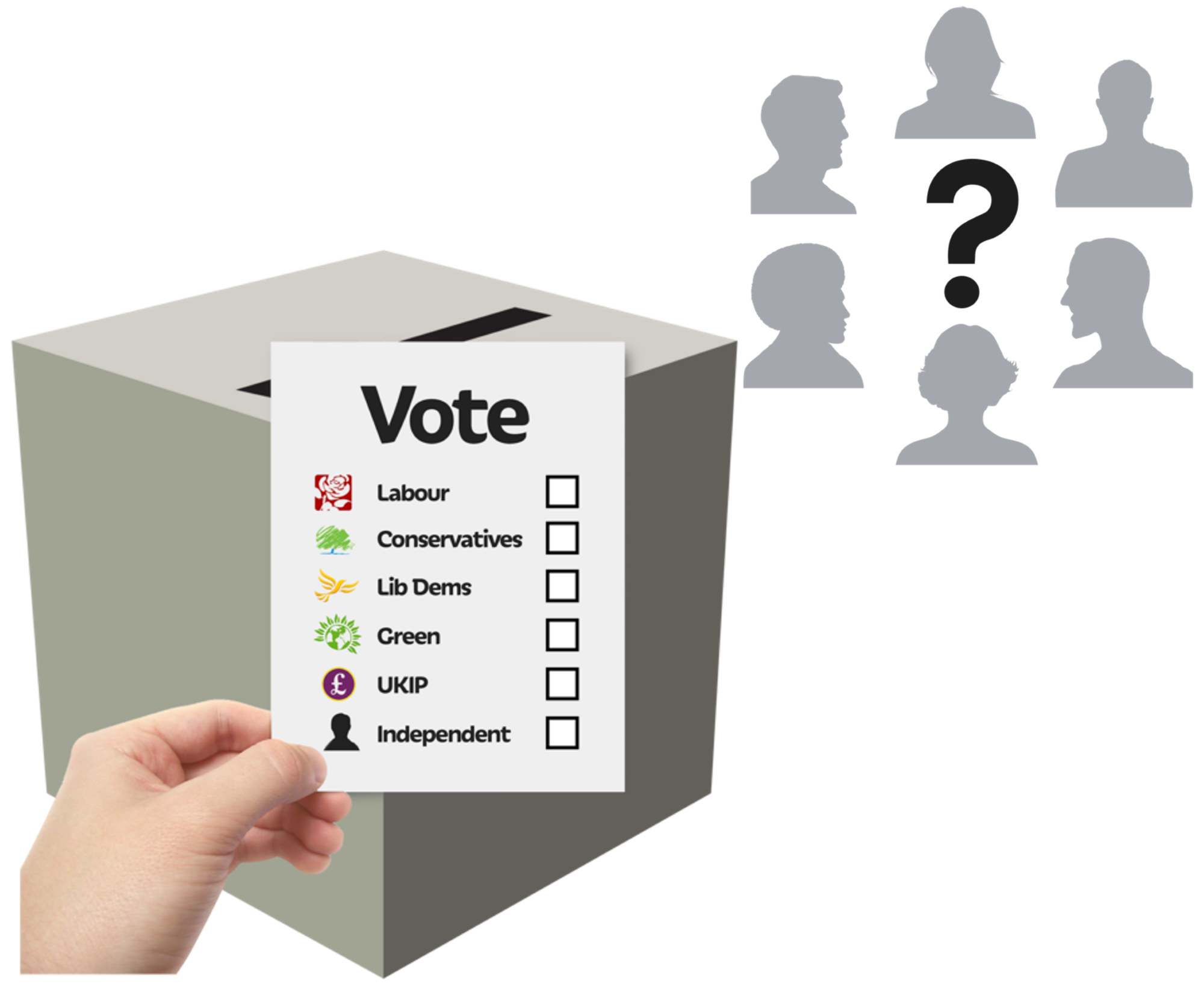-
The Government
 The Government are the people who run the country. The Government decide how much tax people should pay and how things like the National Health Service (NHS) should work.
is running out of time to bring the Mental Health Bill into
law
The Government are the people who run the country. The Government decide how much tax people should pay and how things like the National Health Service (NHS) should work.
is running out of time to bring the Mental Health Bill into
law
 Laws are the rules that everyone in the country has to follow. If you don't follow the rules you can get in trouble with the police.
before the next general
election
Laws are the rules that everyone in the country has to follow. If you don't follow the rules you can get in trouble with the police.
before the next general
election
 An election is when people choose who should be in charge of something. This could be in charge of a group, an area, or the country. People choose by voting. The person with the most votes wins.
.
An election is when people choose who should be in charge of something. This could be in charge of a group, an area, or the country. People choose by voting. The person with the most votes wins.
. -
Dropping the bill would mean backtracking on a Conservative manifesto promise to “...make it easier for people with learning disabilities and autism
 Autism is a disability. Autistic people find it difficult to understand what other people think and feel. They also find it difficult to tell people what they think and feel. Everyone with autism is different.
to be discharged from hospital and improve how they are treated in law.”
Autism is a disability. Autistic people find it difficult to understand what other people think and feel. They also find it difficult to tell people what they think and feel. Everyone with autism is different.
to be discharged from hospital and improve how they are treated in law.”
-
Currently more than 2,000 autistic people and people with learning disabilities are stuck in mental health hospitals that can't meet their needs and can cause harm.
-
The National Autistic Society and Mencap are launching open letters urging Rishi Sunak to act now to end this crisis.
The National Autistic Society and Mencap are calling on Rishi Sunak to reform outdated mental health law, as thousands of autistic people and people with learning disabilities remain stuck in mental health hospitals.
The Government published its draft Mental Health Bill last year, which proposed vital changes to the Mental Health Act. The bill is a chance to change outdated laws that define autism and learning disabilities as mental health conditions, and to introduce better protection for autistic people and people with learning disabilities.
Currently, 92% of the 2,000 autistic people and people with a
learning disability
 A learning disability is to do with the way someone's brain works. It makes it harder for someone to learn, understand or do things.
in mental health units are detained under the Mental Health Act.1 The bill was seen as a huge step forward in the
campaign
A learning disability is to do with the way someone's brain works. It makes it harder for someone to learn, understand or do things.
in mental health units are detained under the Mental Health Act.1 The bill was seen as a huge step forward in the
campaign
 A campaign is when people work together to try to change something.
to stop the scandal of autistic people and people with learning disabilities being wrongly detained in mental health hospitals.
A campaign is when people work together to try to change something.
to stop the scandal of autistic people and people with learning disabilities being wrongly detained in mental health hospitals.
But now the Government is running out of time to introduce its Mental Health Bill so these important changes can become law ahead of the next general election. Dropping the bill would mean breaking the Conservative Party’s manifesto promise to “… make it easier for people with learning disabilities and autism to be discharged from hospital and improve how they are treated in law.”
According to Assuring Transformation NHS Digital data published today, in August 2023 2,040 autistic people and people with learning disabilities are in inpatient mental health hospitals in England and 1,325 (65%) of these people are autistic. There are 200 autistic people or people with learning disabilities who are under 18, and 95 of these are autistic.
Many of these people are stuck in mental health hospitals without access to appropriate support, in environments that lead to avoidable physical and mental deterioration. They are often far away from their homes and loved ones, with the average length of stay being more than five years. Furthermore, we know people are being subjected to overmedication, restraint, isolation and abuse in these settings.
NHS data shows that since the earlier draft bill was introduced over 450 days ago, 2,135 autistic people or people with learning disabilities have been admitted to hospital – an average of around four people per day. Research by Mencap shows the Government’s commitment to reduce inpatient numbers by 50% by March 2024 will not be achieved until November 2028 at the earliest at the current pace of change.
The recent NHS Safe and Wellbeing Review found that more than half (57%) of autistic people and people with learning disabilities were in hospitals away from their homes and families, while 41% of people did not need to be in hospital and their needs could be met in the
community
 A community is the people and places in an area.
. Additionally, analysis by the National Autistic Society shows that, instead of decreasing since government targets were set, the proportion of autistic people in mental health hospitals has nearly doubled – from 35% in 2015 to 65% now.
A community is the people and places in an area.
. Additionally, analysis by the National Autistic Society shows that, instead of decreasing since government targets were set, the proportion of autistic people in mental health hospitals has nearly doubled – from 35% in 2015 to 65% now.
The Government’s promised changes to the Mental Health Act are essential to achieve, and go beyond, the planned 50% reduction in inpatient numbers that was set out in the NHS Long Term Plan and re-committed to in the Building the Right Support Action Plan. The Mental Health Bill must be included in the King’s Speech on November 7 2023.

Leo Andrade is mother to son Stephen, 28, who has a learning disability and is autistic. Stephen was detained under the Mental Health Act for over six years, against the wishes of his family. Leo is campaigning alongside Mencap and the National Autistic Society to ensure autistic people and people with learning disabilities can no longer be wrongly locked up.
Leo Andrade said: “My son Stephen has a learning disability and autism. Throughout his whole life it has been a battle to get the support that he needs.
"In 2013 the right support broke down and he was sectioned under the Mental Health Act. He was locked away in a mental health hospital more than 70 miles from our home and the people who love him most. Stephen was over-medicated, restrained and traumatised in the hospital. I battled for years to get him out.
“Stephen doesn’t have a mental health condition so should never have been detained in a mental health hospital. What my son desperately needed was the right environment and support to help him to be happy and enjoy his life in his community. He was failed by the system.
“This is the experience of too many other people and their families. This is wrong and it is time to act.”

Alison Rodgers, mother of Adam, 31, who is currently an inpatient under the Mental Health Act, said: “Adam has spent half of his life in hospital. Today he’s still detained in hospital, and seems no closer to coming out, instead he has gone deeper and deeper into the system. He has a learning disability, autism and ADHD.
“Staff don't understand his autism, ADHD and sensory issues. They just see him as having '
challenging behaviour
 Challenging behaviour can be when someone hurts themselves, hits or pinches someone else, or breaks something. Some people might behave like this because they are upset or because people do not understand them.
’ rather than that he is communicating he is upset.
Challenging behaviour can be when someone hurts themselves, hits or pinches someone else, or breaks something. Some people might behave like this because they are upset or because people do not understand them.
’ rather than that he is communicating he is upset.
“I have tried everything to bring him out into the community, but I'm not listened to. He's not a threat to anyone. He should have been given the right support package in the community instead, not sent to a high secure hospital. He has deteriorated in this environment. It is the wrong place to meet his needs.”
Tim Nicholls, Head of Influencing and Research at the National Autistic Society, said: “This is one of the greatest
human rights
 Human
rights
Human
rights
 Rights are the things everyone should be allowed to do like have a say, or go to school.
are the rights that everyone has. These include the right to go to school and the right to start a family.
crises of our generation – and it must end now. Autism is not a mental health condition and mental health hospitals are not the right place for the vast majority of autistic people. Yet we’ve seen countless harrowing examples of people being locked away in seclusion and subjected to abuse in these settings.
Rights are the things everyone should be allowed to do like have a say, or go to school.
are the rights that everyone has. These include the right to go to school and the right to start a family.
crises of our generation – and it must end now. Autism is not a mental health condition and mental health hospitals are not the right place for the vast majority of autistic people. Yet we’ve seen countless harrowing examples of people being locked away in seclusion and subjected to abuse in these settings.
“The trauma caused to those who are wrongly detained in hospitals, scared and alone without the right support they need, is unimaginable – with a devastating and long-lasting impact on their physical and mental health.
“The Government must urgently bring the Mental Health Bill into law so that autism is no longer defined as a “mental disorder”. But time is running out. We’re calling on as many people as possible to sign our open letter and tell Rishi Sunak that now is the Time to Act – this crisis cannot be allowed to continue.”
Dan Scorer, Head of Policy and Public Affairs at Mencap, said: “It is unacceptable that in the 21st century the law allows for people with a learning disability and autistic people to be locked up in mental health hospitals for years on end when they don't have a mental health condition.
“Being held in a mental health institution without a mental health condition is both wrong and deeply damaging and traumatic for people with a learning disability and their families. “We need to see investment in early intervention and better community support to prevent admission in the first place.
“Reforming this legislation is a crucial step so that people with a learning disability can no longer be institutionalised. Every delay in reforming the Act is another day where people are being wrongly detained. It is essential that the Bill be brought forward as a matter of urgency."
The National Autistic Society and Mencap are calling on the Government to bring the draft Mental Health Act Bill into law to ensure:
-
Autistic people and people with learning disabilities cannot be detained in a mental health hospital under Section 3 of the Mental Health Act solely on the basis of having a learning disability or autism (without a co-occurring mental health condition).
-
There is a strong duty to provide community services to autistic people and people with a learning disability to prevent them from reaching crisis point in the first place, and ensure those in hospital can be discharged in a timely way.
-
Recommendations from Care, Education
 Education is when you learn things. When you fill in a form to get a job, education means you write where you went to school, college or university.
and Treatment Review actions are made enforceable, so people can be discharged from hospitals sooner.
Education is when you learn things. When you fill in a form to get a job, education means you write where you went to school, college or university.
and Treatment Review actions are made enforceable, so people can be discharged from hospitals sooner.
To sign the open letter, visit the websites of the National Autistic Society and Mencap.
Notes to editors
For more information or to arrange interviews, please contact the National Autistic Society press office at press@nas.org.uk and 0207 903 3593, and the Mencap press office at media@mencap.org.uk and 0207 696 5414.
About the National Autistic Society
-
The National Autistic Society is the UK’s leading charity for autistic people.
-
We are here to transform lives, change attitudes and create a society that works for autistic people.
-
Since 1962, we have been campaigning for autistic people’s rights and providing support and advice to autistic people and their families.
-
To find out more about autism or the charity, visit www.autism.org.uk.
-
Follow the National Autistic Society on Twitter, Facebook and Instagram.
About autism
-
Autism is a lifelong developmental disability which affects how people communicate and interact with the world.
-
At least one in 100 people are autistic, which means more than 700,000 people in the UK.
-
All autistic people have difficulties with communication and social interaction.
-
Autism is a spectrum condition. This means autistic people have their own strengths and varying and complex needs, from 24-hour care to simply needing clearer communication and a little longer to do things at work and school.
-
Without the right support or understanding, autistic people can miss out on an education, struggle to find work and become extremely isolated.
-
Although everyone is different, people on the autism spectrum may:
-
be under or oversensitive to sounds, touch, tastes, smells, light or colours, which can make everyday life extremely difficult.
-
be unable to or find it harder to speak, face delays processing information or find it hard to hold conversations.
-
experience intense anxiety around unexpected change and social situations.
-
become so overwhelmed that they experience debilitating physical and emotional ‘meltdowns’ or ‘shutdowns’.
-
Read our guidance
 Guidance means being given clear instructions to be able to do something well.
on how to talk and write about autism.
Guidance means being given clear instructions to be able to do something well.
on how to talk and write about autism.
About Mencap
Mencap exists to ensure the UK is the best place in the world for people with a learning disability to live happy and healthy lives. We support people directly and campaign with people with a learning disability, their families and carers. We work to change laws, increase representation and fight for better health, social care and
employment
 Employment means having a job.
opportunities for the 1.5 million people with a learning disability in the UK.
Employment means having a job.
opportunities for the 1.5 million people with a learning disability in the UK.
What is a learning disability?
-
A learning disability is a reduced intellectual ability which affects someone for their whole life. Typically, people with a learning disability need more time to learn and process information. They may need extra support to develop skills, complete tasks and interact with others, or they may have more complex needs requiring round-the clock care. The level of support needed is different for everyone and may change during a person’s lifetime.
-
Learning disability is NOT a mental illness or a learning difficulty. Often, the term ‘learning difficulty’ is wrongly used in place of ‘learning disability’. Having a learning difficulty (such as ADHD or dyslexia
 Dyslexia is a learning difficulty. People who have dyslexia can find it hard to read, write and spell.
) may mean a person learns at a different pace or in a different way BUT – unlike a learning disability - it does not affect a person’s intellect.
Dyslexia is a learning difficulty. People who have dyslexia can find it hard to read, write and spell.
) may mean a person learns at a different pace or in a different way BUT – unlike a learning disability - it does not affect a person’s intellect.
-
With the right support, most people with a learning disability can lead happy, healthy, independent lives. At Mencap, it’s our mission to remove societal barriers and shatter misconceptions to make this more possible for more people.
Mencap’s guide to reporting on Learning Disability
When it comes to creating content with people with a learning disability, we know many people feel nervous about saying and doing the wrong thing. Our guide for journalists, covers everything from up-to-date facts and figures to the right language to use. It also includes tips on how to work with people with a learning disability to gather the best content.